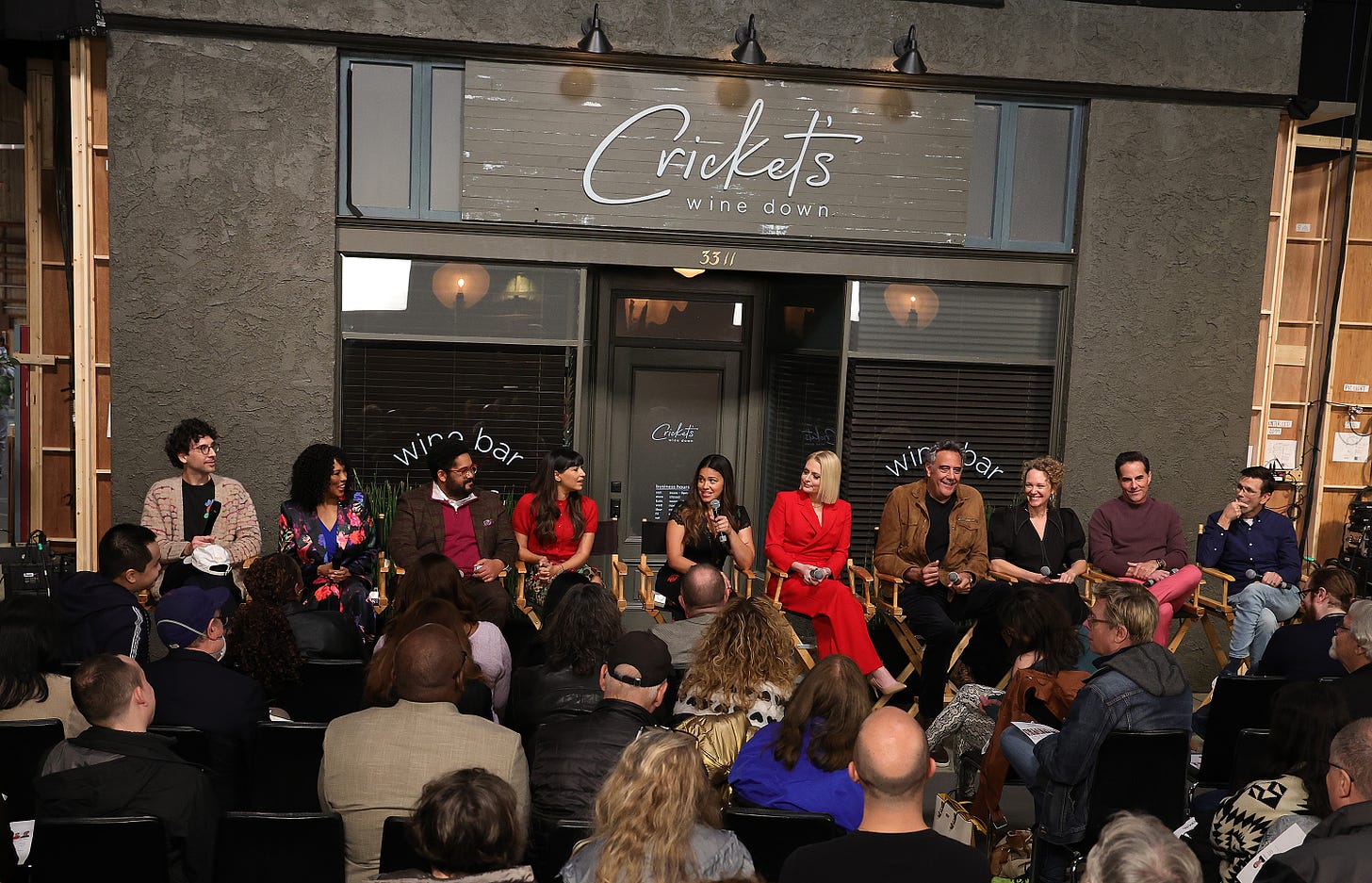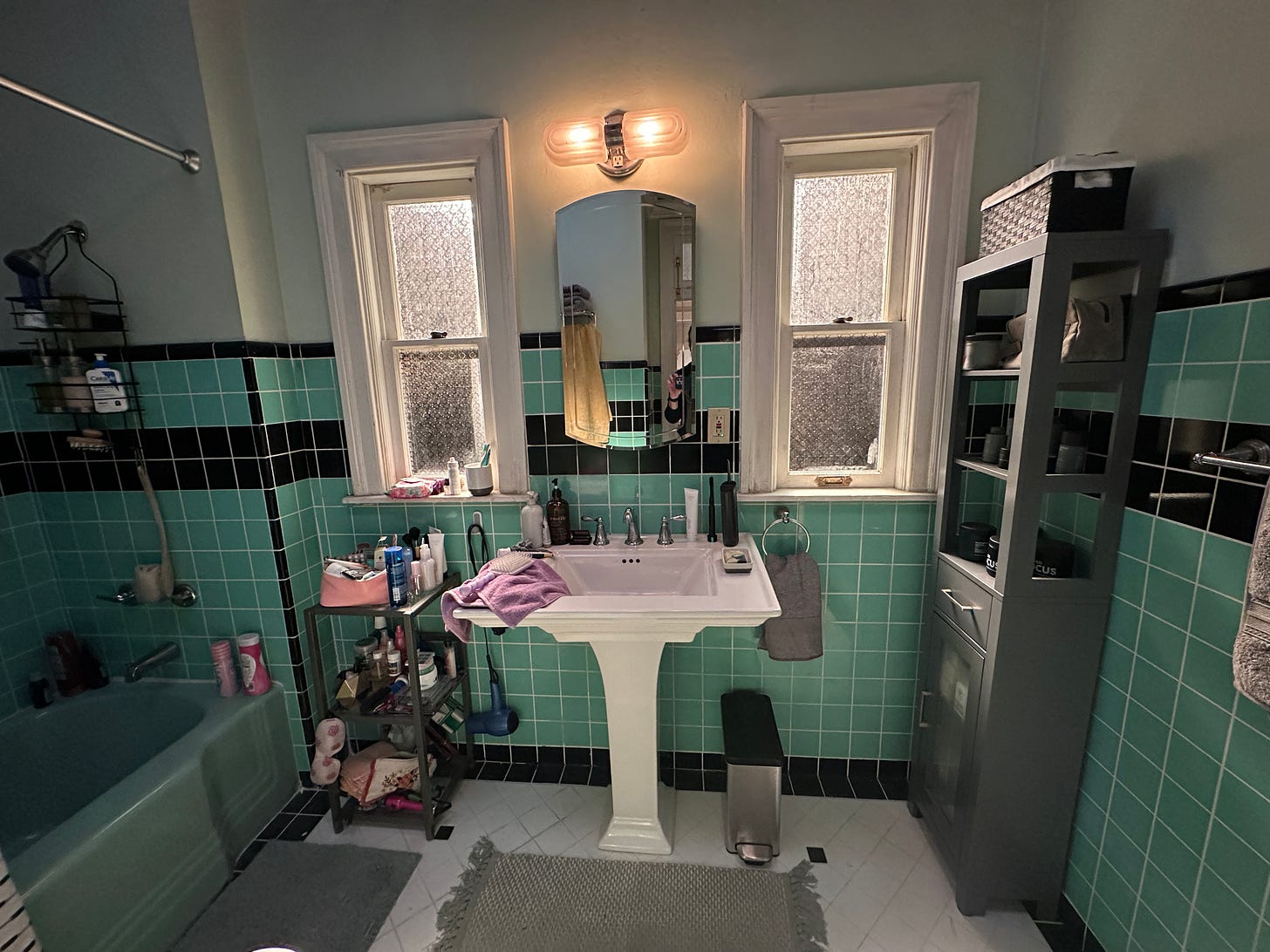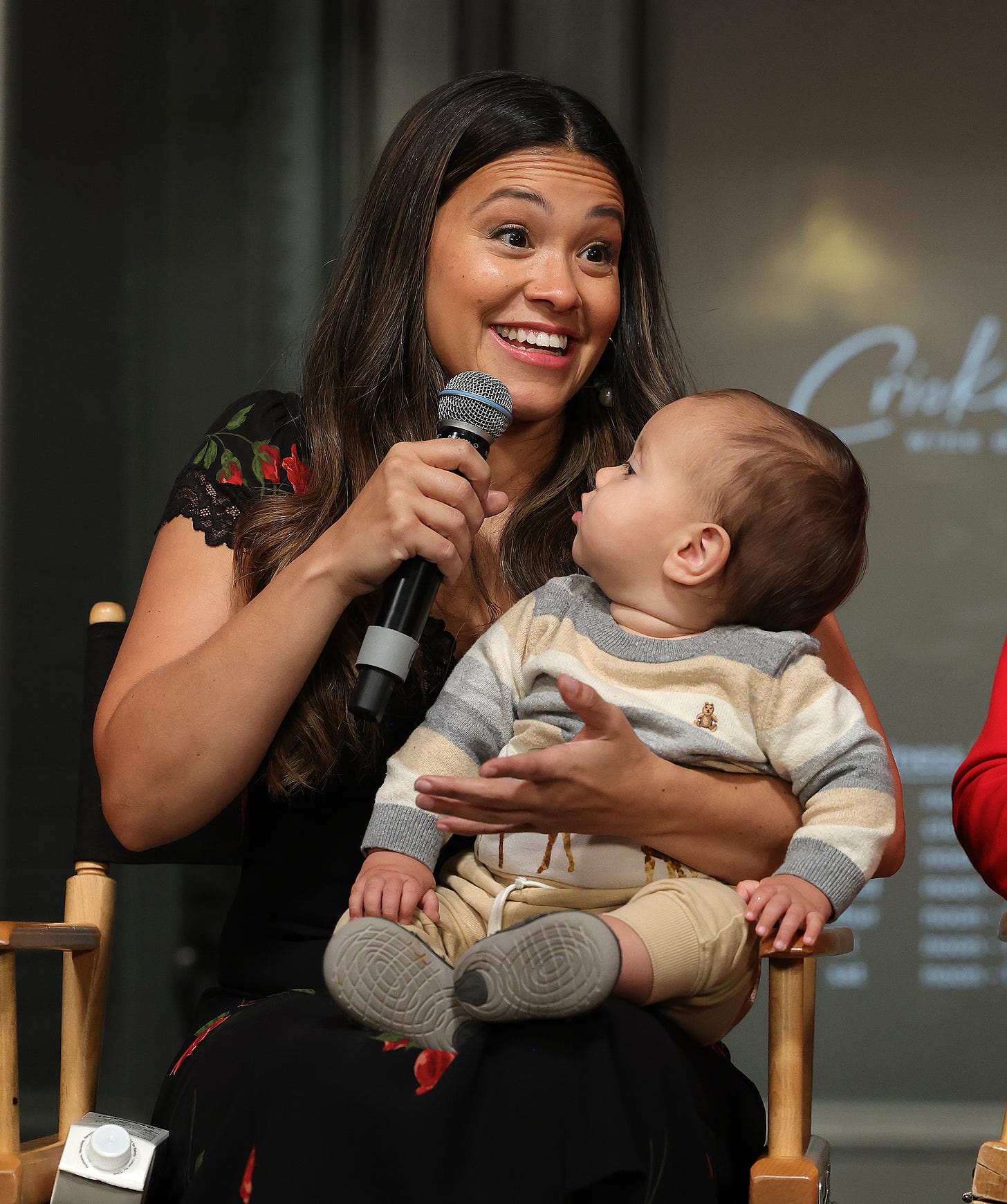Panel-to-Panel: Best Supporting Journalists in a Press Tour?
Sometimes you write criticism, sometimes you fist bump a baby
Panel-to-Panel is my ongoing journal from the bi-annual Television Critics Association Press Tour, as part of Episodic Medium’s Week-to-Week newsletter—it’s free to all subscribers, and will let you know what we’re covering for paid subscribers on a week-to-week basis. For more information on the newsletter, see our About Page.
When executives or publicists take the stage to welcome assembled journalists to a TCA session, they often begin with some variation on “thank you so much for supporting our shows.” And every time it happens, I think to myself: is that what we’re doing?
There are certainly ways that contemporary television journalism has angled in this direction, through the emergence of the enthusiast press working to give fans scoops on their favorite shows and the industry-oriented service journalism of For Your Consideration campaigning. But “criticism” as a practice is not in service to networks or streaming services—it’s in service of the audience, offering perspective on the endless deluge of content in an era of Peak TV to help viewers make educated decisions on what to watch.
During a session on Press Tour’s second day, Hub Interactive Research (who are newly on Substack) gave a presentation arguing that this function of critics is more important than ever in our Peak TV moment. At the evening cocktail party, I asked them what they meant by this, and they specifically cited how Star-Ledger critics Alan Sepinwall and Matt Zoller Seitz had influenced their viewing living in New Jersey. Their publicist, meanwhile, cited Emily Nussbaum. But the idea of a “TV critic” being hired by a publication has effectively stalled in the intervening decade since the golden age of online TV criticism, with any journalist trying to make a living writing about television needing to do far more than just reviewing the shows that come across their desk. Of the people in the TCA ballroom this week, an increasingly small number have the luxury of simply watching everything—well, as much of everything as they can—and recommending things to their readers, as opposed to serving some combination of industry interest and SEO prioritization (subscriptions to this Substack and my actual job allow me to be one of them).
But the thing about Press Tour is that our very presence can often function as a form of support, depending on how you conceive of the purpose of the event. If we think of this purely as a form of promotion for massive conglomerates, then it’s easy to be cynical about the suggestion that we’re here to “support” Hulu insofar as helping them meet subscriber goals. But the day before, when their corporate colleagues at National Geographic presented a slate of documentary programs, there was a different energy to the idea of “support” when it’s about a project highlighting the untold history of black astronauts or their Oscar-nominated documentary about Ugandan opposition leader Bobi Wine.
This idea of “support” came to mind for me watching the panel for the latter project, Bobi Wine: The People’s President, and I asked Wine and his wife Barbie Kyagulanyi about what their experience had been like doing awards screenings and other events in the leadup to the Academy Awards. Specifically, I asked what their experience was like “campaigning for an Oscar,” and Wine and Kyagulanyi both smiled as they asked each other if that was what they were doing. After some laughter from the crowd, Wine answered that he didn’t see it that way:
“For us, it's a campaign for life. For us, this is a lifeline. Every opportunity we get to show the situation in Uganda, we are extending our lease on life because we know that first and foremost, the energy and the sustainability of the regime comes from the developed world. The more Americans see this film, the more Europeans see this film, the more attention will be drawn to our home.”
Wine’s remarks made clear that in the case of that particular panel, our very presence and the words we write are supporting a fight against a dictatorship. And the same was true for The Space Race, as retired astronaut and executive producer Leland Martin graciously thanked us for being there to help tell the documentary’s story after we chatted with him after the panel (mostly about his dogs and Krys Marshall in For All Mankind, if we’re being honest). National Geographic’s day—like PBS’ day next week—made the idea of “support” tangible and real, in a way that is harder for more strictly commercial networks/channels to manifest.
That being said, though, that somewhat depends on the context and the talent involved in a given panel. To start, critics will clearly “support” shows that are good, in the hopes of inspiring the industry to keep making the show and shows like it. Other times, a show is “important” in ways that make covering it a matter of public service—Hulu paneled We Were The Lucky Ones, a hopeful holocaust drama about the real-life story of author Georgia Hunter’s family’s struggle and survival during World War II, and producers and stars answered questions about book bannings and the lack of awareness of the holocaust among younger generations. I don’t know that the drama—I only had time to screen one episode—is excellent, but I certainly support its right to exist more than a program without the same subject matter.
But in other cases, the talent for comedies or dramas without the same social message behind them can nonetheless emphasize what the project means to them personally, and make that visible in ways that make journalists want to support them and their work even if they might be lukewarm on the show itself. I had honestly never checked in on ABC’s Gina Rodriguez-led Not Dead Yet—about an obituary writer haunted by her subjects—after it debuted at midseason, but when I saw they had scheduled a set visit during Press Tour I watched the pilot and finale from the first season, and the two episodes of season two made available to critics in advance. I enjoyed them well enough, and had some questions about how they reassessed their show and its components between seasons, so I went into the set visit with a solid interest in hearing from the cast and producers.
But when dinner and a tour of Nell’s apartment concluded and the panel began, the takeaway was less about the answer to my question and more about the dynamic of the show’s cast. Gina Rodriguez arrived to the panel carrying her son Charlie, who was born after the first season completed production (she was in her third trimester when ABC paneled the show at the last Press Tour), and she immediately emphasized that this wasn’t just so she could win some “Awwwws” from collected critics (mind you, she got them). Instead, she wanted to emphasize how important the show has been to her as a new mother, and the supportive environment she’s received in terms of being able to juggle parenthood with starring in and producing a TV show. When Charlie wasn’t in her lap, he was off with his father (in matching sweaters) practicing walking and (just occasionally) fussing in the distance, and it was a refreshingly honest view of how much the set became a space of work-life balance. Watching her co-stars interact with Charlie really sold the idea of the cast as a family, a thing that is often said as part of panels but rarely demonstrated with such clarity.
And so while I don’t know that I have any need to “support” ABC as a network, after a panel like that it becomes easier to imagine supporting a show when it’s creating such a supportive environment for those involved. It’s not quite the same support I’d give to journalism colleagues whose positions are erased by corporate malfeasance or to workers fighting for a fair contract or the recognition of a newly-formed union, but there’s a sense of solidarity that emerges when you start to see actors or producers are real people whose projects are both their livelihood and their passion. I’m not going to suddenly become a Not Dead Yet superfan, but the earnestness on display makes it easier to pass along word of the show’s return (with newly added co-star Brad Garrett) than I was based on the screeners alone.
And as far as “support” is concerned, we’ll revisit this conversation when considering the rest of the Disney ecosystem, beginning with the singularly TCA-friendly FX this afternoon.
Episodic Observations
Hulu shared its time with Disney’s “Onyx Collective” banner that provides diverse content for the service, including Queenie (coming in June) and Natasha Rothwell’s fall series How To Die Alone. I enjoyed the episode I saw of each, but I’m always curious how that brand is meant to function—does its existence imply that Hulu in and of itself does not invest in diverse programming? How aware are audiences of the separate branding, or is it more industry-facing? I might ask at tomorrow’s executive session, although Disney’s leadership has so much to address that it might not sneak in.
Hulu also held a breakfast for upcoming reality series Vanderpump Villa, which star/producer Lisa Vanderpump described to our table as a tourist-gaze trip to the French countryside with a balance of the drama between her workers and the stories of the guests celebrating milestones at the location when she stopped by our table with one of her dogs sporting a pearl leash (“just from Amazon”). Critics appreciated the star sighting, sure, but they were more excited by actual warm pastries—priorities.
Nat Geo’s one scripted series, Genius, paneled its current MLK/X season, which debuted last week. As with The New Look, it’s really two separate shows about characters who rarely intersect, but the producers are relying on thematic parallels to tie the stories together. This was the one show I didn’t get a chance to sample, but I appreciated star Aaron Pierre (who plays Malcolm X) emphasizing the importance of background artists in his performance of key speeches.
While there wasn’t a baby, Wednesday’s set visits also included a panel with the cast of the newly-moved to ABC 9-1-1, which revealed they’re doing a full riff on The Poseidon Adventure in Tim Minear’s latest work mining absolute insanity out of the show’s broadcast success.
Just after I asked Bobi Wine about campaigning for an Oscar in the oft-controversial space of the documentary branch, Sam Adams published an article at Slate that really spoke to the disconnect between the subject of projects like this one and the politics of Oscar campaigns.
It felt really meaningful—and Nat Geo positioned it accordingly—to have a panel of all women for a nature documentary focused on telling stories about female animals (Queens, coming in March), but I can’t fully endorse the project because I scanned through an episode and was immediately scarred by the tragedy I witnessed.
Yes, I fist bumped Gina Rodriguez’s baby. I couldn’t leave him hanging. I’m not made of stone.






It's a tricky balance, isn't it? We do want to steer our readers toward TV that's worth their time, so in that sense we are boosters of the shows we like; and I know that matters (and should!) to the people who make those shows. But I got an email today from the Amazon publicity department thanking critics who wrote positively about "Mr. & Mrs. Smith" for being good "partners," and even though I really liked that show, I do not like being called a partner. Their job is to make good stuff, my job is to recognize that it's good, and that should be the end of it, in terms of any relationship. It's the same reason I won't submit any reviews to Rotten Tomatoes, even if the review is positive and a publicist asks nicely. If RT wants to find my review and include it in their ratings, fine. If this helps the movie or TV show I reviewed, fine. But I'm not paid by Rotten Tomatoes and I'm not paid by the movie/TV production company, so to do that work on either's behalf feels unprofessional to me. It marks me as a fan, not a journalist. Those lines can get blurry sometimes but I still think they're necessary.
Oh I really loved Not Dead Yet's first season and the first ep of season 2 was not one of their best but I still enjoy the vibe and the characters (plus I've missed Brad Garrett since Single Parents)